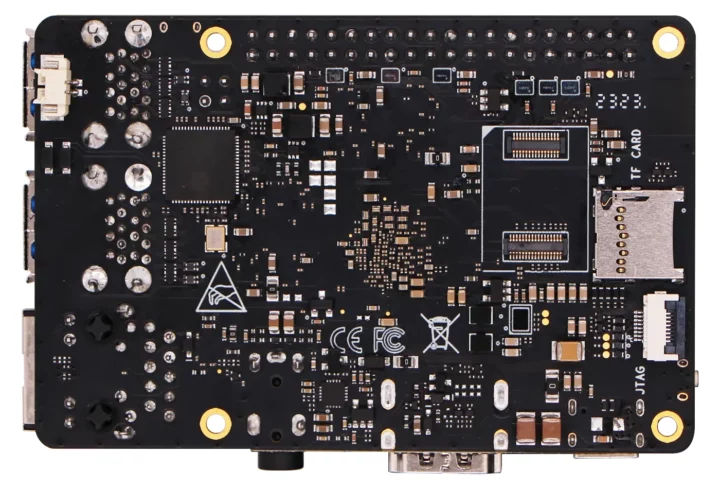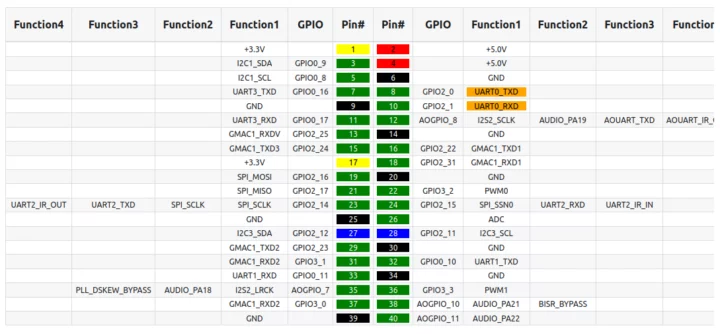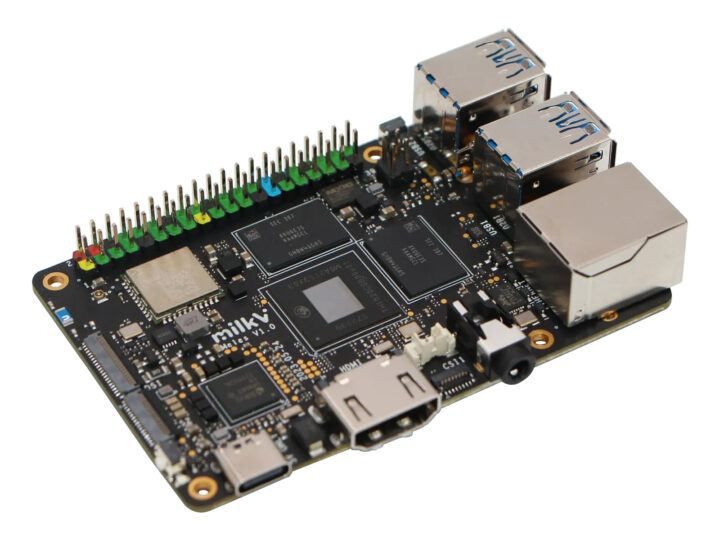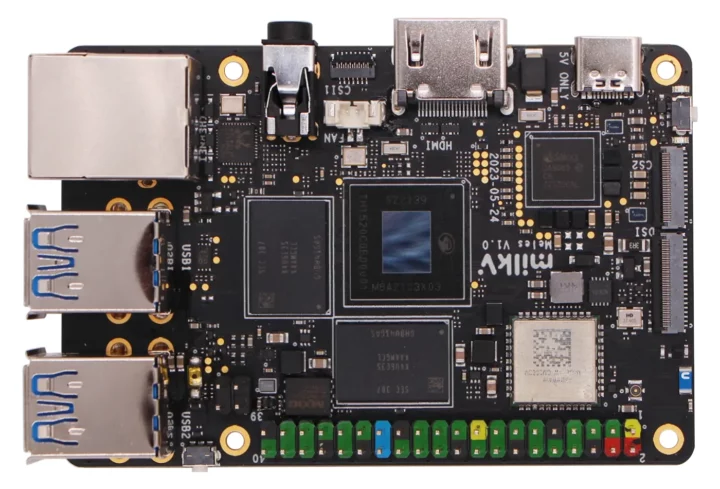Shenzhen Milk-V Technology’s Meles SBC (single board computer) is powered by a T-Head TH1520 quad-core RISC-V processor and offered in a credit card form factor similar to the Raspberry Pi 3 Model B layout.
The board is quite more powerful with a 2.0 GHz quad-core SoC equipped with a modern GPU, a 4K capable video encoder and decoder, and a 4 TOPS NPU. The board also features gigabit Ethernet, a WiFi 5 and Bluetooth 5.2 module, four USB 3.0 ports, HDMI 2.0 video output, MIPI CSI and DSI interfaces, and a 40-pin GPIO header.
Meles specifications:
- SoC – Alibaba T-Head TH1520
- CPU
- Quad-core RISC-V Xuantie C910 (RV64GCV – Vector Extension version 0.7) processor up to 2.0 GHz
- Low-power Xuantie E902 core
- GPU – Imagination BXM-4-64 GPU with support for OpenGL ES3.0/3.1/3.2, OpenCL 1.1/1.2/2.0, Vulkan 1.1/1.2; 50.7GFLOPS
- DSP – Xuantie C906 audio DSP @ 800 MHz
- VPU
- Video Decoder
- H.265, H.264, VP9, AVS2.0 up to 4Kp75
- VP8/7/6, AVS+, VC1, MPEG4 up to 1080p60
- Video Encoder – H.264 and H.265 up to 4K @ 40 FPS
- Video Decoder
- AI accelerator – 4 TOPS NPU
- CPU
- System Memory – 8GB or 16GB LPDDR4x @ 4266MT/s
- Storage
- MicroSD card slot
- eMMC flash socket
- SPI flash
- Video Output
- HDMI 2.0 up to 4K @ 60Hz
- 4-lane MIPI DSI with touchscreen support
- Camera I/F
- 4-lane MIPI CSI connector
- 2-lane MIPI CSI connector
- Audio
- 3.5mm audio output jack
- Digital audio via HDMI
- I2S audio input and output via 40-pin GPIO header
- Networking
- Gigabit Ethernet RJ45 port
- On-board Wi-Fi 5 and Bluetooth 5.2 module (Ampak AP6256) with ceramic antenna and external antenna connector
- USB
- 4x USB 3.0 host ports
- USB 2.0 Type-C device port
- Expansion – 40-pin (mostly) Raspberry Pi-compatible GPIO header with up to 3x UART, 2x I2C, 1x SPI, 1x I2S,1x ADC, 8x GPIO, C910 debug port
- Debugging – JTAG connector
- Misc
- Reset and Recovery buttons
- Bootmode button for eMMC / SPI flash boot selection
- Power and user LEDs
- 2-pin fan connector
- Power Supply
- 5V / 4A DC in via Type-C port
- PoE with add-on board connected through 4-pin header
- Dimensions – 85×56 mm


The board runs the Debian-based Meles RevyOS with LXDE desktop environment and is said to support audio, video, Ethernet, WiFi, Bluetooth, AI, and other features well on the Meles RISC-V SBC. The company provides a binary file, but you can also build the image from source by following the instructions on GitHub. Note that RISC-V SBCs are still mostly developer kits as we’ve seen with the Lichee Pi 4A console running Debian last January, and Canonical only provides a Ubuntu 24.04 server for the Mars SBC.
It’s the second RISC-V SBC in credit card form factor from Shenzhen Milk-V Technology as the Mars SBC offers similar features but is based on the StarFive JH7110 quad-core SoC instead and is much cheaper. The Meles SBC provides many of the same features as the Sipeed LicheePi 4A, but in a smaller factor since the latter relies on a carrier board + SoM design.
The Meles credit card-sized RISC-V can be purchased on Arace for $80 and up. But that’s provided there’s stock as most boards sold on Arace… Two variants are listed (and out of stock at the time of writing: one with 8GB of RAM and a 128GB eMMC module and the other with 16GB of RAM. More details may be found on the product page.
Thanks to Mark for the tip.

Jean-Luc started CNX Software in 2010 as a part-time endeavor, before quitting his job as a software engineering manager, and starting to write daily news, and reviews full time later in 2011.
Support CNX Software! Donate via cryptocurrencies, become a Patron on Patreon, or purchase goods on Amazon or Aliexpress






